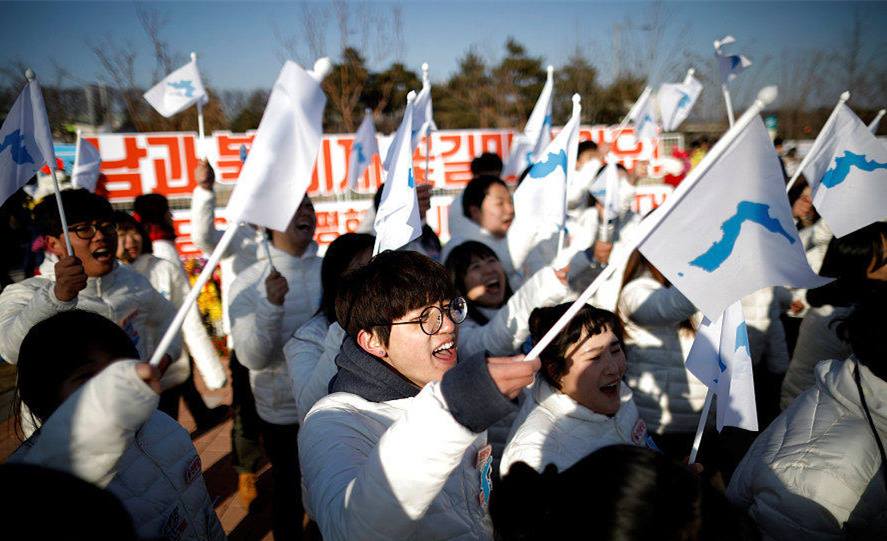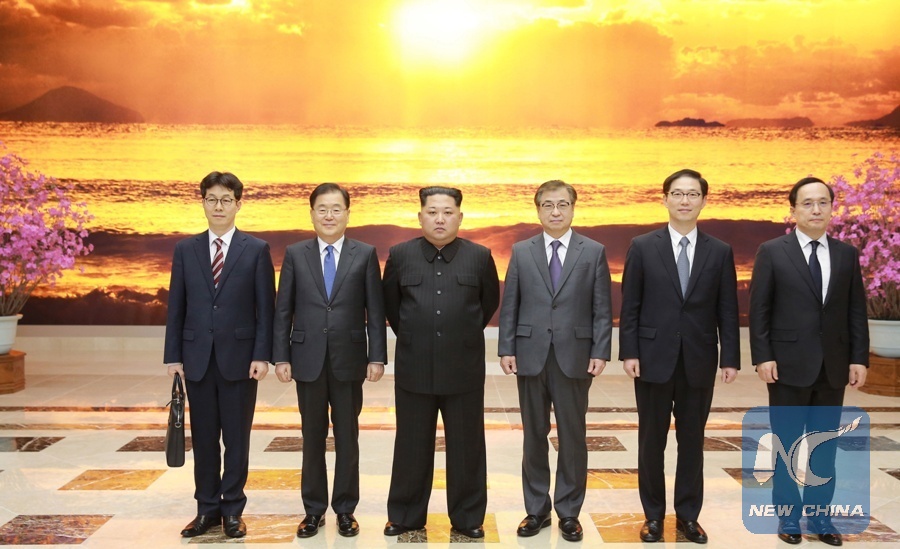BEIJING, April 25 (Xinhua) -- Divided by a war almost seven decades ago that ended in a truce, the two Koreas on each side of the 38th parallel are beefing up preparations for an ice-breaking summit scheduled for Friday.

Photos: Xinhua
With the Democratic People's Republic of Korea (DPRK) announcing the suspension of its nuclear and missile tests and South Korea proposing to ink a peace agreement that formally ends the stalemate following the 1950-53 Korean War, the world has welcomed these reconciliatory gestures leading up to the summit, for which expectations are high.
POSITIVE INTERACTION
In what is widely perceived as a dramatic turn of events, Kim Jong-un, the DPRK's top leader, announced Saturday that his country would "discontinue" its nuclear and missile tests.
The surprise decision was made public at a plenary session of the ruling Workers' Party of Korea, where Kim also said Pyongyang was dismantling the nuclear test site in the country's north since it "no longer needs" nuclear and intercontinental ballistic missile tests.
Also at the plenum, Kim rallied his people to shift focus on economic development and improve the standard of living, heralding a major policy change.
Kim invited South Korean President Moon Jae-in for direct talks in a message delivered by his sister, Kim Yo Jong, when she met Moon in Seoul in February.
In early March, Moon's national security adviser, Chung Eui-yong, led the first high-level South Korean delegation to Pyongyang since Kim took power six years ago, and had a four-hour "openhearted talk" with Kim.
After briefing US President Donald Trump on his trip to Pyongyang, Chung told reporters outside the White House that Trump accepted Kim's offer for a meeting and said it was expected to happen "by May."
In addition to the DPRK's efforts in easing confrontation, South Korea, for its part, has also been busy preparing for the much-anticipated inter-Korean summit, which observers say will also lay the groundwork for the planned Trump-Kim talks.
A third round of working-level talks between officials of the two Koreas was held Monday at the Peace House on the South Korean side of Panmunjom, a village at the Demilitarized Zone.
The Peace House has been chosen as the site of Friday's summit, making Kim the first DPRK leader to step onto South Korean soil after the Korean War, although the distance between the demarcation line and the Peace House is only several hundred meters.
Building upon the previous two rounds of talks, the two sides continued to discuss details concerning the arrangement of the summit, involving matters of security, protocol and media coverage.
They talked about the way Kim crosses the border and how he will be greeted by Moon, and reached consensus on a live broadcast of the historic event by South Korean media.
Furthermore, South Korea's presidential office, known as the Blue House, said last Friday that a hotline had been created to link the two leaders for the first time since the separation of the two Koreas.
Moon and Kim can now call each other directly from their respective offices, skirting the phone link at Panmunjom, which used to be a main communication channel.
In a further sign to set a friendly climate for Friday's talks, Seoul's defense ministry said the propaganda broadcasts to the DPRK were silenced at midnight on Monday. It was a break from what is known as the anti-DPRK psychological warfare, which Seoul resumed in 2016 following Pyongyang's fourth nuclear test.

Photo provided by Korean Central News Agency (KCNA) on March 6, 2018 shows Kim Jong-un (3rd L), top leader of the Democratic People's Republic of Korea (DPRK), posing for a group photo with the members of South Korean delegation.
HIGH EXPECTATIONS
In South Korea, the DPRK's decision to halt its nuclear and missile tests was hailed by Moon as an "important decision" that would give "a green light" to the success of both inter-Korean and US-DPRK summits.
Having been extending olive branches to Kim and bridging Pyongyang and Washington since South Korea hosted the Winter Olympics in February, Moon regards improving the situation on the Korean Peninsula as a major task of his presidency.
To achieve that goal, however, he will also have to quell skepticism from conservative political factions at home.
"The entire world is watching and the entire world is hoping for its success. I ask that our political circles, too, will halt their political warfare at least during the summit," Moon said Monday in remarks carried by the Yonhap news agency.
Eliminating the possibility of war is something South Korea wants to bring up at the Moon-Kim summit. However, to replace the fragile armistice treaty -- Seoul and Pyongyang today are still technically at war -- with a permanent peace deal will be no easy task.
Up until now, the United States has not yet openly confirmed its desire to respect the DPRK's current political system, and Seoul and Washington will have to decide what to do with the US troops deployed on South Korean territory should a peace deal be struck between the two Koreas.
China, which shares borders with the DPRK and is a major stakeholder in the Korean Peninsula issue, welcomed Pyongyang's decision.
Chinese Foreign Ministry spokesman Lu Kang said the move will ease tensions, promote denuclearization and facilitate a political settlement on the Korean Peninsula.
On Kim's announcement to concentrate on economic development, Lu said China hopes that "the DPRK will continue to achieve results in its economic development and improvement of people's living standards."
In the meantime, Russia, also one of the six nations that formed a multilateral mechanism seeking a political solution to the Korean Peninsula nuclear issue, asked Washington and Seoul to reciprocate the DPRK's efforts to reduce tension on the peninsula.
"We urge the United States and South Korea to take adequate measures aimed at reducing military activities in the region and achieving mutually acceptable agreements with the DPRK at the upcoming inter-Korean and US-DPRK summits," said a statement issued by the Russian Foreign Ministry on Saturday.
The six-party talks mechanism, grouping China, the DPRK, South Korea, Japan, Russia and the United States, has been suspended since 2009 when the DPRK pulled out. China and Russia have repeatedly called for its resumption.


